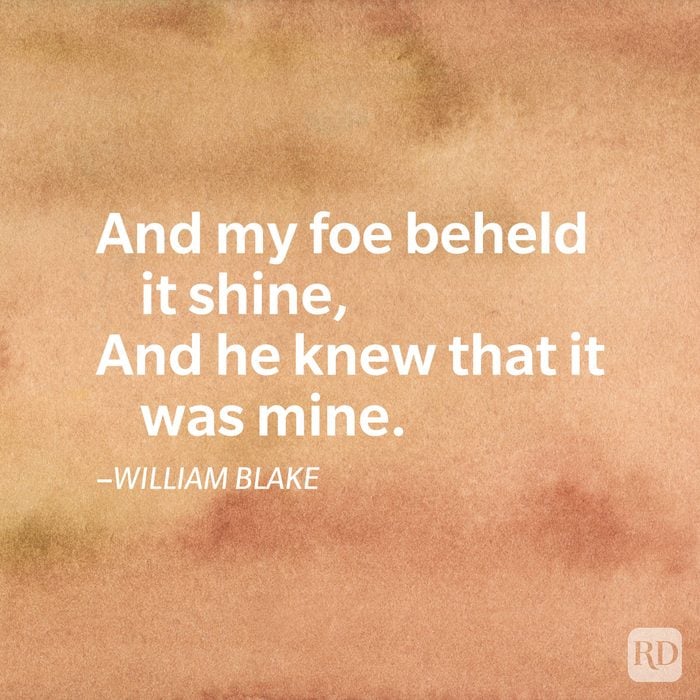
Give these famous poems a read
What jumps into your mind when you think of the most famous poems ever written? Shakespearean love poems? Something longer that you might find in a poetry book? Maybe something by Poe or Dickinson? Or perhaps you’re just taking your first steps into the world of poetry, so none of these ring a bell. That’s OK. The beauty of poetry is its universal appeal—the most famous poems ever written are just as enjoyable to newcomers as they are to aficionados.
Still, I understand how intimidating it can be to try to navigate an ocean of poetry that you’ve only dipped your toes into, especially considering its breadth and diversity: There are more authors, publications, movements and subgenres than anybody can read in a lifetime. So where should you start for the best poems about life and all its ups and downs? Make your way through this list, and you’ll find yourself 20 poems richer.
These aren’t just any poems either—they’re some of the most famous and influential lines ever written in the history of the literary form. With these relatively short poems, you’ll understand why poets are peerless when it comes to putting our deepest emotions into words.
Get Reader’s Digest’s Read Up newsletter for more poetry, humor, cleaning, travel, tech and fun facts all week long.
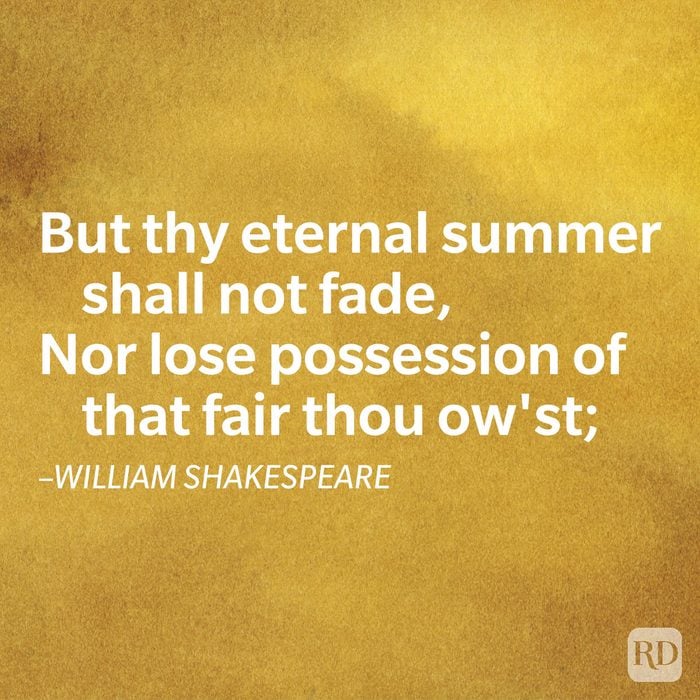
1. “Sonnet 18” by William Shakespeare
Shall I compare thee to a summer’s day?
Thou art more lovely and more temperate:
Rough winds do shake the darling buds of May,
And summer’s lease hath all too short a date;
Sometime too hot the eye of heaven shines,
And often is his gold complexion dimm’d;
And every fair from fair sometime declines,
By chance or nature’s changing course untrimm’d;
But thy eternal summer shall not fade,
Nor lose possession of that fair thou ow’st;
Nor shall death brag thou wander’st in his shade,
When in eternal lines to time thou grow’st:
So long as men can breathe or eyes can see,
So long lives this, and this gives life to thee
Naturally, our list had to start with the Bard. While it is tough to pick a favorite work of William Shakespeare, “Sonnet 18” is definitely a top contender. Not only is it one of the most famous poems ever written, but it’s also one of his most beautiful and iconic love poems. Want to express deep affection? Forget those silly roses-are-red poems and start with one of the English language’s literary giants.
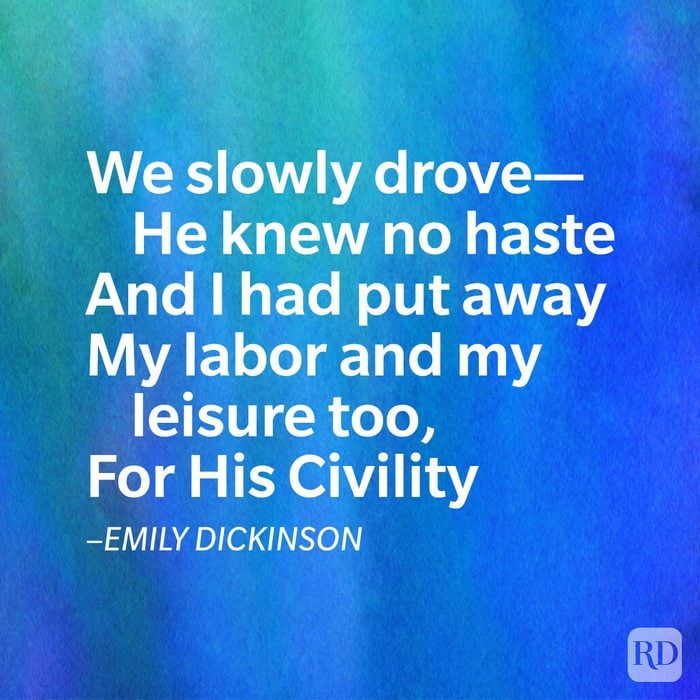
2. “Because I Could Not Stop for Death” by Emily Dickinson
Because I could not stop for Death—
He kindly stopped for me—
The Carriage held but just Ourselves—
And Immortality.
We slowly drove—He knew no haste
And I had put away
My labor and my leisure too,
For His Civility—
We passed the School, where Children strove
At Recess—in the Ring—
We passed the Fields of Gazing Grain—
We passed the Setting Sun—
Or rather—He passed Us—
The Dews drew quivering and Chill—
For only Gossamer, my Gown—
My Tippet—only Tulle—
We paused before a House that seemed
A Swelling of the Ground—
The Roof was scarcely visible—
The Cornice—in the Ground—
Since then—’tis Centuries—and yet
Feels shorter than the Day
I first surmised the Horses’ Heads
Were toward Eternity—
Published posthumously in 1890, “Because I Could Not Stop for Death” is arguably one of the poet’s most celebrated and most famous poems. In it, the speaker takes a carriage ride with personified death, who appears not as a menacing reaper but a “kindly” driver taking her to eternity. Like many funeral poems that give comfort to the grieving, Emily Dickinson’s piece—and the final stanza, in particular—suggests the dead might live on in the afterlife.
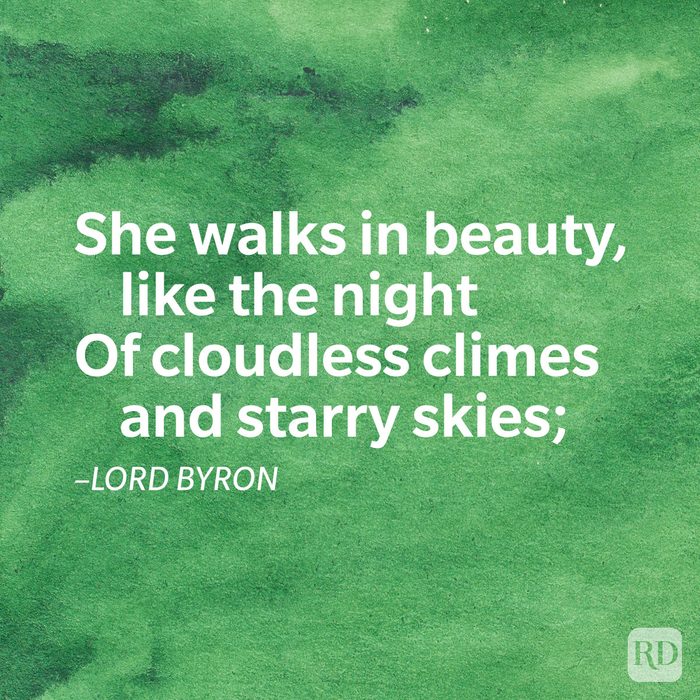
3. “She Walks in Beauty” by Lord Byron
She walks in beauty, like the night
Of cloudless climes and starry skies;
And all that’s best of dark and bright
Meet in her aspect and her eyes;
Thus mellowed to that tender light
Which heaven to gaudy day denies.
One shade the more, one ray the less,
Had half impaired the nameless grace
Which waves in every raven tress,
Or softly lightens o’er her face;
Where thoughts serenely sweet express,
How pure, how dear their dwelling-place.
And on that cheek, and o’er that brow,
So soft, so calm, yet eloquent,
The smiles that win, the tints that glow,
But tell of days in goodness spent,
A mind at peace with all below,
A heart whose love is innocent!
An icon of his time, Lord Byron (aka George Gordon) is one of the best-known English poets of the early 19th-century Romantic Movement. He’s just as famous for his countless affairs with men and women as he is for his famous poems. It’s no surprise, then, that the poet not only inspired the Byronic hero character in fiction but also wrote some of the most romantic lines in poetry. If you’re hunting for the perfect love poem for a woman, look no further than Byron’s most famous lines. “She Walks in Beauty” praises a woman’s inner and outer beauty, complementing physical attributes as well as inner innocence and purity.
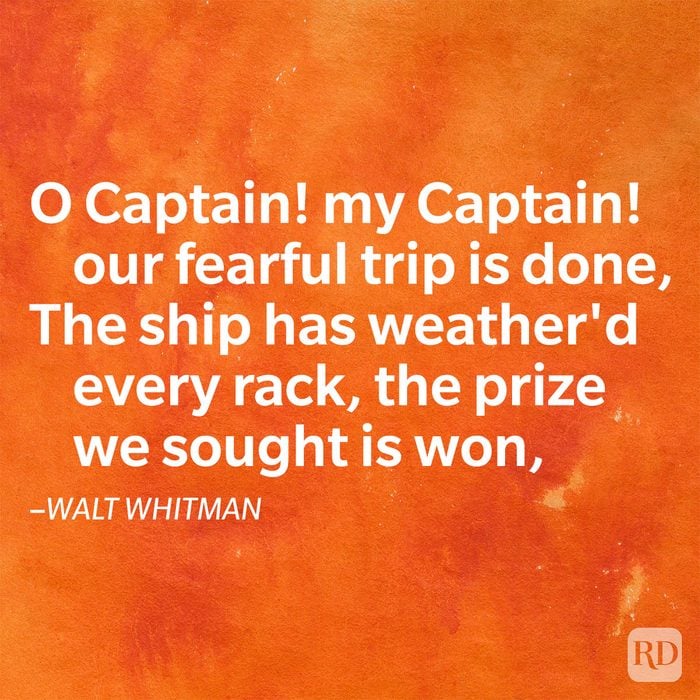
4. “O Captain! My Captain!” by Walt Whitman
O Captain! my Captain! our fearful trip is done,
The ship has weather’d every rack, the prize we sought is won,
The port is near, the bells I hear, the people all exulting,
While follow eyes the steady keel, the vessel grim and daring;
But O heart! heart! heart!
O the bleeding drops of red,
Where on the deck my Captain lies,
Fallen cold and dead.
O Captain! my Captain! rise up and hear the bells;
Rise up—for you the flag is flung—for you the bugle trills,
For you bouquets and ribbon’d wreaths—for you the shores a-crowding,
For you they call, the swaying mass, their eager faces turning;
Here Captain! dear father!
This arm beneath your head!
It is some dream that on the deck,
You’ve fallen cold and dead.
My Captain does not answer, his lips are pale and still,
My father does not feel my arm, he has no pulse nor will,
The ship is anchor’d safe and sound, its voyage closed and done,
From fearful trip the victor ship comes in with object won;
Exult O shores, and ring O bells!
But I with mournful tread,
Walk the deck my Captain lies,
Fallen cold and dead.
This poem will be instantly recognizable to fans of the 1989 film Dead Poets Society—in fact, “O Captain! my Captain!” is one of the most memorable quotes from the movie. But even without its mention in the film, Walt Whitman’s poem deserves a spot on the list of the most famous poems ever written. Penned in 1865 as a tribute to Abraham Lincoln, who was assassinated that year, “O Captain! My Captain!” is an ode to bravery and untimely death. And it continues to inspire readers centuries later.
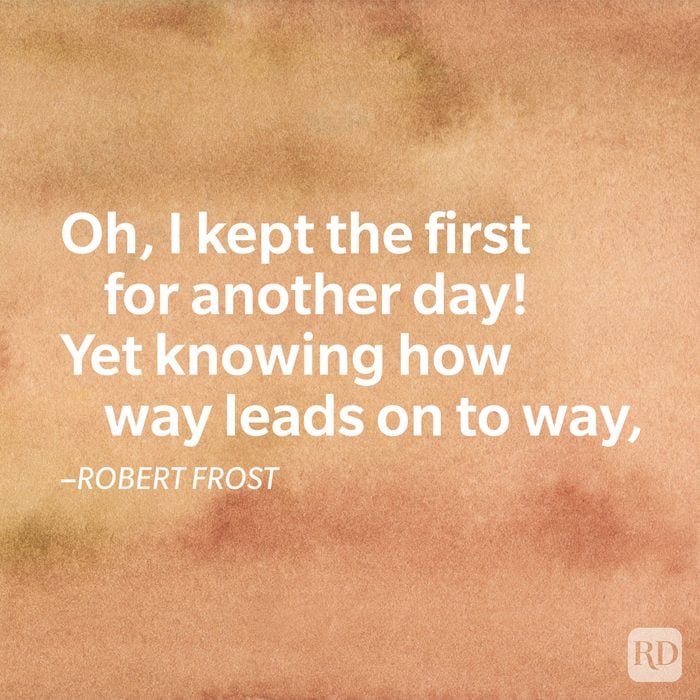
5. “The Road Not Taken” by Robert Frost
Two roads diverged in a yellow wood,
And sorry I could not travel both
And be one traveler, long I stood
And looked down one as far as I could
To where it bent in the undergrowth;
Then took the other, as just as fair,
And having perhaps the better claim,
Because it was grassy and wanted wear;
Though as for that the passing there
Had worn them really about the same,
And both that morning equally lay
In leaves no step had trodden black.
Oh, I kept the first for another day!
Yet knowing how way leads on to way,
I doubted if I should ever come back.
I shall be telling this with a sigh
Somewhere ages and ages hence:
Two roads diverged in a wood, and I—
I took the one less traveled by,
And that has made all the difference.
On the surface, Robert Frost’s “The Road Not Taken” is a beautiful account of the poet’s walk in the woods. But dig deeper, and you’ll find a lesson wrapped up in Frost’s metaphor of a split in the road. This inspirational poem offers a valuable lesson on the importance of singularity and distinct personality. Instead of following the path countless others have taken, forge ahead on the road fewer have trod. It will, as the poet writes, make “all the difference” in life.
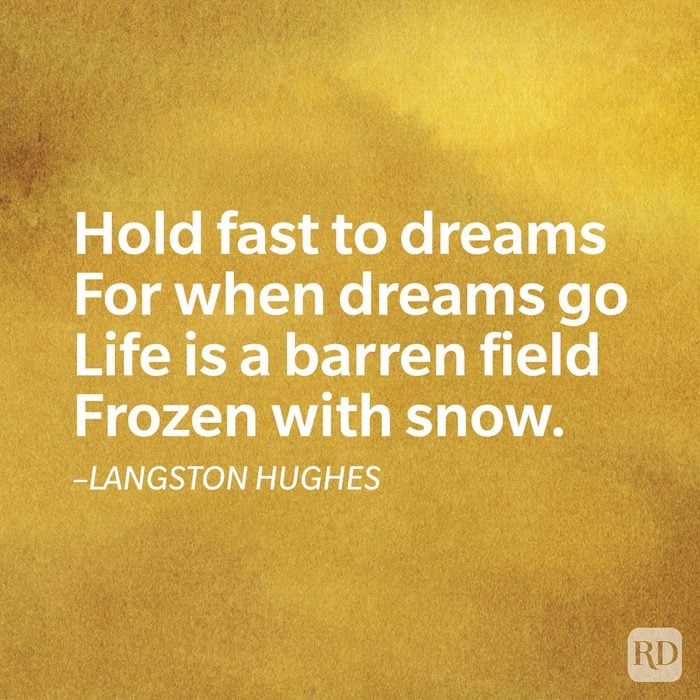
6. “Dreams” by Langston Hughes
Hold fast to dreams
For if dreams die
Life is a broken-winged bird
That cannot fly.
Hold fast to dreams
For when dreams go
Life is a barren field
Frozen with snow.
Langston Hughes, a significant voice in American poetry, one of the most well-recognized Black poets of the 20th century and the leader of the Harlem Renaissance, writes about the importance of dreams and urges his readers to hold on to theirs. Without our dreams, Hughes says in this short yet powerful poem, our lives lose meaning and we are like birds that cannot fly.
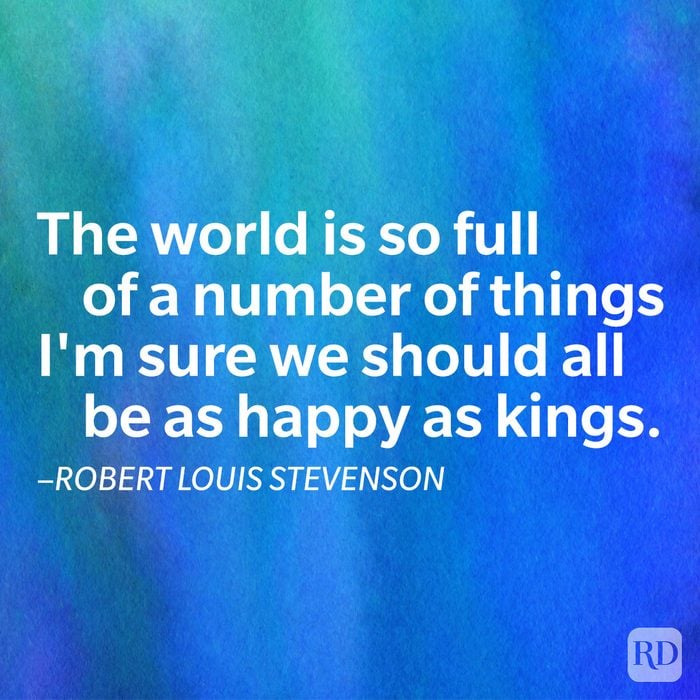
7. “Happy Thought” by Robert Louis Stevenson
The world is so full of a number of things
I’m sure we should all be as happy as kings.
Feeling down about the state of the word? Give “Happy Thought” a read. Robert Louis Stevenson, author of the classic novel Treasure Island, needs only two lines to teach a valuable lesson about gratitude and life’s little joys.
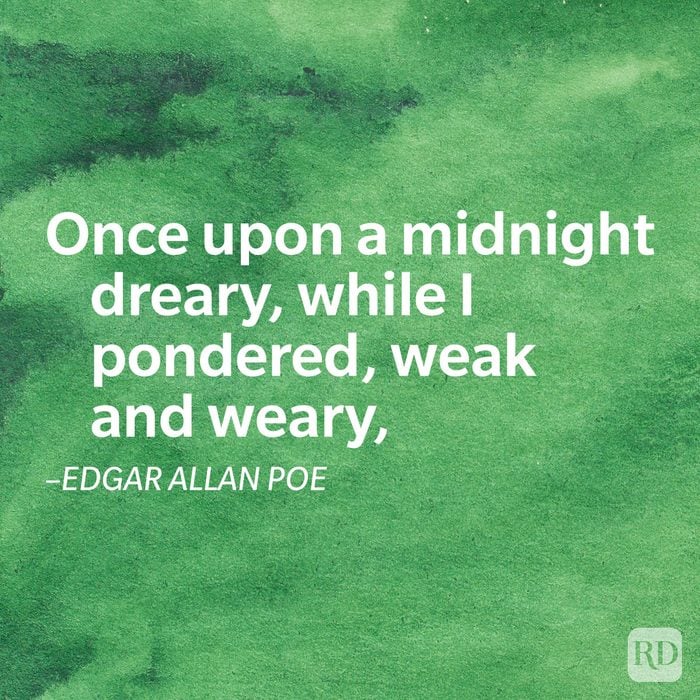
8. “The Raven” by Edgar Allan Poe
Once upon a midnight dreary, while I pondered, weak and weary,
Over many a quaint and curious volume of forgotten lore—
While I nodded, nearly napping, suddenly there came a tapping,
As of some one gently rapping, rapping at my chamber door.
“‘Tis some visitor,” I muttered, “tapping at my chamber door—
Only this and nothing more.”
Edgar Allan Poe’s famously dark tone is on full display in this iconic poem about a man’s struggle with grief as he descends into madness, captured with intricate symbolism and Poe’s Gothic horror themes. The opening above sets the stage for an 18-stanza poem full of despair and longing—and Poe’s characteristic eerie undertones. Want to read the full poem? Check out The Raven and Other Poems. It’s not the kind of comforting book that will help you grieve; it’s a haunting meditation on love and loss.
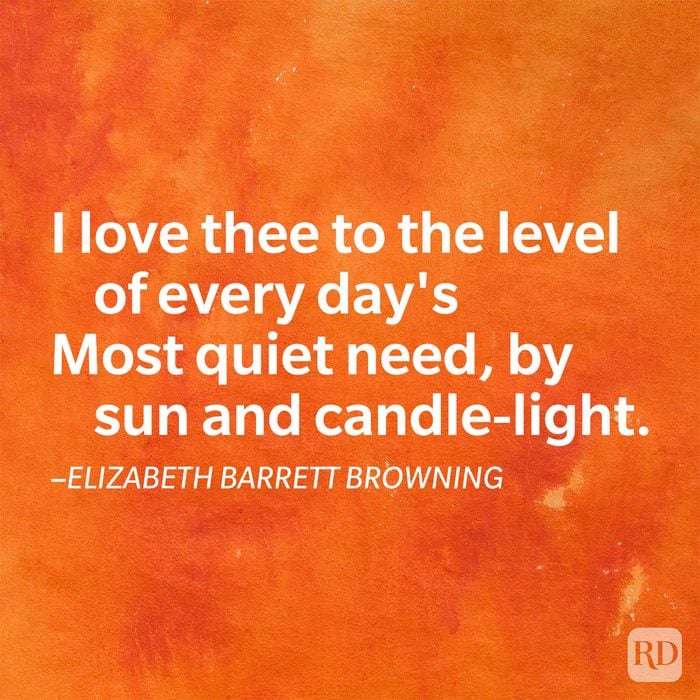
9. “How Do I Love Thee?” by Elizabeth Barrett Browning
How do I love thee? Let me count the ways.
I love thee to the depth and breadth and height
My soul can reach, when feeling out of sight
For the ends of being and ideal grace.
I love thee to the level of every day’s
Most quiet need, by sun and candle-light.
I love thee freely, as men strive for right;
I love thee purely, as they turn from praise.
I love thee with the passion put to use
In my old griefs, and with my childhood’s faith.
I love thee with a love I seemed to lose
With my lost saints. I love thee with the breath,
Smiles, tears, of all my life; and, if God choose,
I shall but love thee better after death.
It’s no surprise that many of the most famous poems ever written tackle the joy and heartbreak that comes with love, and if you want a love poem for men, Elizabeth Barrett Browning’s work is a fantastic choice. “How Do I Love Thee” describes a love so pure and so strong that it remains unwavering in the face of time and stretches beyond the grave.

10. “I’m Nobody! Who Are You?” by Emily Dickinson
I’m nobody! Who are you?
Are you nobody, too?
Then there’s a pair of us—don’t tell!
They’d banish us, you know.
How dreary to be somebody!
How public, like a frog
To tell your name the livelong day
To an admiring bog!
As one of America’s most well-regarded poets, Emily Dickinson has more than a few famous poems to her name. In this one, she explores themes of anonymity and humility, noting how much better it is to avoid the constant need for recognition, a draining effort she dubs “dreary.” These valuable quotes about life are even more significant in a modern world focused on fame, where everyone can be someone with the right social media accounts.
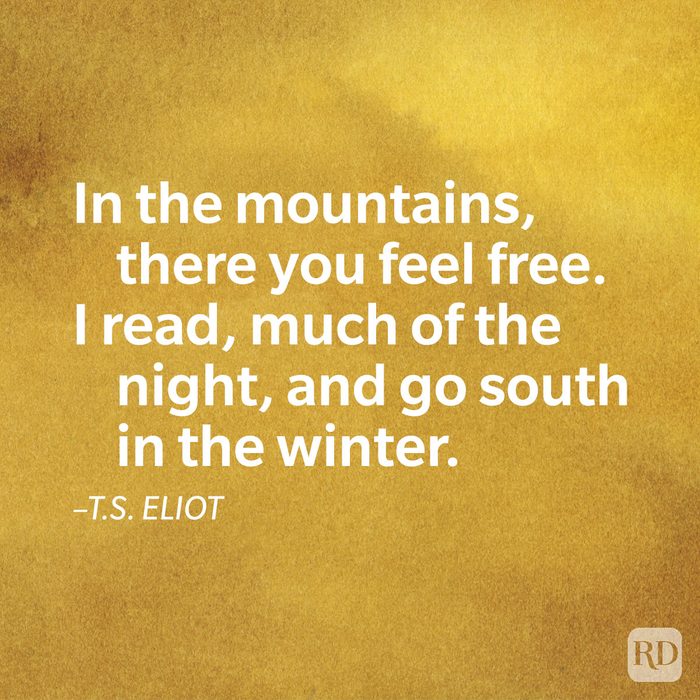
11. “The Wasteland” by T.S. Eliot
April is the cruellest month, breeding
Lilacs out of the dead land, mixing
Memory and desire, stirring
Dull roots with spring rain.
Winter kept us warm, covering
Earth in forgetful snow, feeding
A little life with dried tubers.
Summer surprised us, coming over the Starnbergersee
With a shower of rain; we stopped in the colonnade,
And went on in sunlight, into the Hofgarten,
And drank coffee, and talked for an hour.
Bin gar keine Russin, stamm’ aus Litauen, echt deutsch.
And when we were children, staying at the archduke’s,
My cousin’s, he took me out on a sled,
And I was frightened. He said, Marie,
Marie, hold on tight. And down we went.
In the mountains, there you feel free.
I read, much of the night, and go south in the winter.
One of the most famous poems ever written and arguably the most significant 20th-century work of poetry, “The Wasteland” is T.S. Eliot’s 1922 masterpiece. It’s one of the longer poems on our list—the above is simply the opening snippet; you can read the full 434-line poem in one of Eliot’s poetry collections—and a bleak exploration of modern life. It’s a powerful work that changes locations, speakers and time to draw upon the dread of living in the era of World War I.
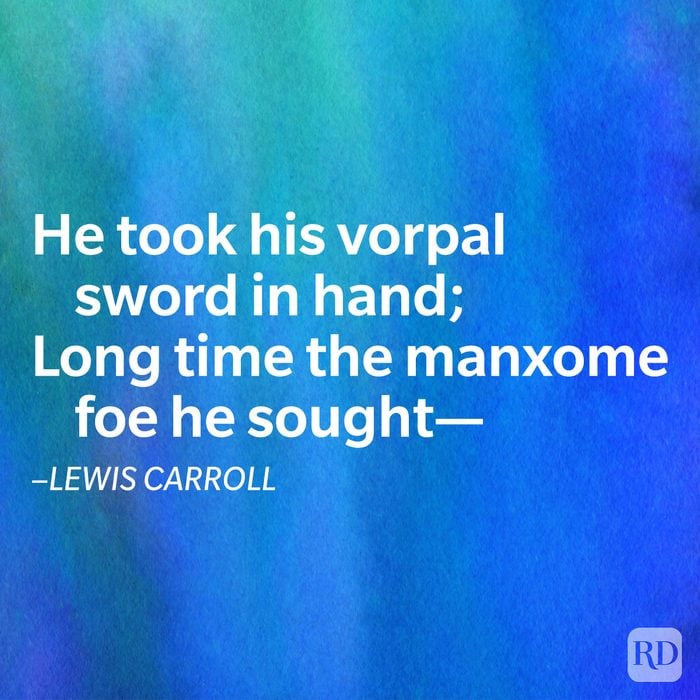
12. “Jabberwocky” by Lewis Carroll
‘Twas brillig, and the slithy toves
Did gyre and gimble in the wabe:
All mimsy were the borogoves,
And the mome raths outgrabe.
“Beware the Jabberwock, my son!
The jaws that bite, the claws that catch!
Beware the Jubjub bird, and shun
The frumious Bandersnatch!”
He took his vorpal sword in hand;
Long time the manxome foe he sought—
So rested he by the Tumtum tree
And stood awhile in thought.
If you only know Lewis Carroll through Alice’s Adventures in Wonderland, you’re missing out on some wonderfully whimsical words. True, Alice in Wonderland quotes are full of seemingly nonsense phrases. But in this funny poem, which appears in Through the Looking-Glass, Carroll outdid himself. It includes many made-up words that were later explained in the novel—and even one, chortle, that later made it into the American lexicon.
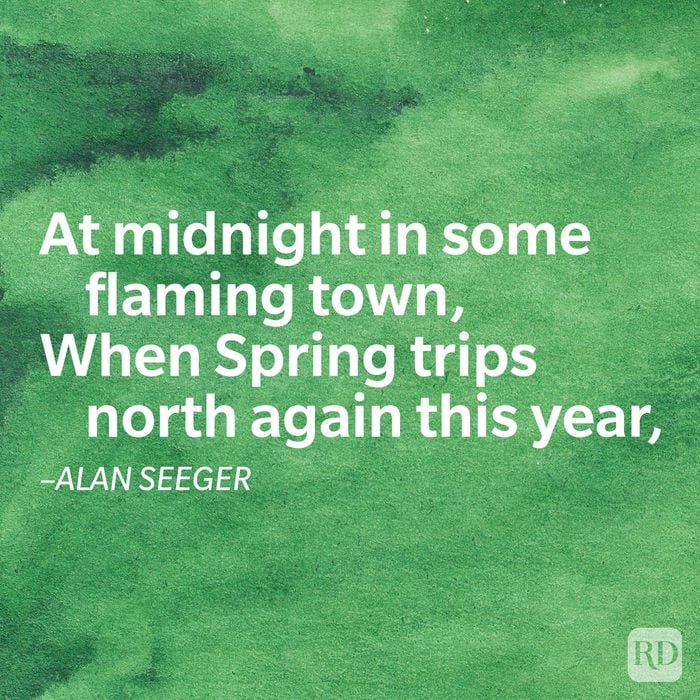
13. “I Have a Rendezvous with Death” by Alan Seeger
I have a rendezvous with Death
At some disputed barricade,
When Spring comes back with rustling shade
And apple-blossoms fill the air—
I have a rendezvous with Death
When Spring brings back blue days and fair.
It may be he shall take my hand
And lead me into his dark land
And close my eyes and quench my breath—
It may be I shall pass him still.
I have a rendezvous with Death
On some scarred slope of battered hill,
When Spring comes round again this year
And the first meadow-flowers appear.
God knows ’twere better to be deep
Pillowed in silk and scented down,
Where Love throbs out in blissful sleep,
Pulse nigh to pulse, and breath to breath,
Where hushed awakenings are dear …
But I’ve a rendezvous with Death
At midnight in some flaming town,
When Spring trips north again this year,
And I to my pledged word am true,
I shall not fail that rendezvous.
Alan Seeger died an untimely death during World War I but not before gifting the world with this beautiful poem. Published in 1917, “I Have a Rendezvous with Death” explores themes of mortality and ultimately leads to the poet’s acceptance of death as the final destination: poetic, yet tragic. The death of a loved one is one of the hardest human experiences, but exploring grief through art and poetry can be transformative.

14. “Fire and Ice” by Robert Frost
Some say the world will end in fire,
Some say in ice.
From what I’ve tasted of desire
I hold with those who favor fire.
But if it had to perish twice,
I think I know enough of hate
To say that for destruction ice
Is also great
And would suffice.
Robert Frost manages to do in nine lines what sagas cannot do in volumes: This simple and symbolic poem highlights the pitfalls of extremity. Fire here is linked to desire, while ice is linked to hatred, and both emotions, according to Frost, can lead to destruction if left untamed. Looking for more must-read poems but perhaps for the younger crowd? There are plenty of poems perfectly suited for kids.

15. “No Man Is an Island” by John Donne
No man is an island,
Entire of itself;
Every man is a piece of the continent,
A part of the main.
If a clod be washed away by the sea,
Europe is the less,
As well as if a promontory were:
As well as if a manor of thy friend’s
Or of thine own were.
Any man’s death diminishes me,
Because I am involved in mankind.
And therefore never send to know for whom the bell tolls;
It tolls for thee.
John Donne, known as the founder of the Metaphysical Poets, is a 16th-century writer who presents an interesting contrast in his work: Although his background is religious, his poetry is often filled with eroticism, cynicism and themes usually not attributed to the divine. “No Man Is an Island” is an exploration of the power of unity and the downfalls of solitude. Donne’s poem is a timeless call for governments and individuals to focus on community.

16. “I Wandered Lonely as a Cloud” by William Wordsworth
I wandered lonely as a cloud
That floats on high o’er vales and hills,
When all at once I saw a crowd,
A host, of golden daffodils;
Beside the lake, beneath the trees,
Fluttering and dancing in the breeze.
Continuous as the stars that shine
And twinkle on the milky way,
They stretched in never-ending line
Along the margin of a bay:
Ten thousand saw I at a glance,
Tossing their heads in sprightly dance.
The waves beside them danced; but they
Out-did the sparkling waves in glee:
A poet could not but be gay,
In such a jocund company:
I gazed—and gazed—but little thought
What wealth the show to me had brought:
For oft, when on my couch I lie
In vacant or in pensive mood,
They flash upon that inward eye
Which is the bliss of solitude;
And then my heart with pleasure fills,
And dances with the daffodils.
A prime example of the Romantic Movement, this poem is a celebration of nature. In it, William Wordsworth uses symbolism—clouds, stars, waves and the like—to explore themes of solitude and self-exploration.
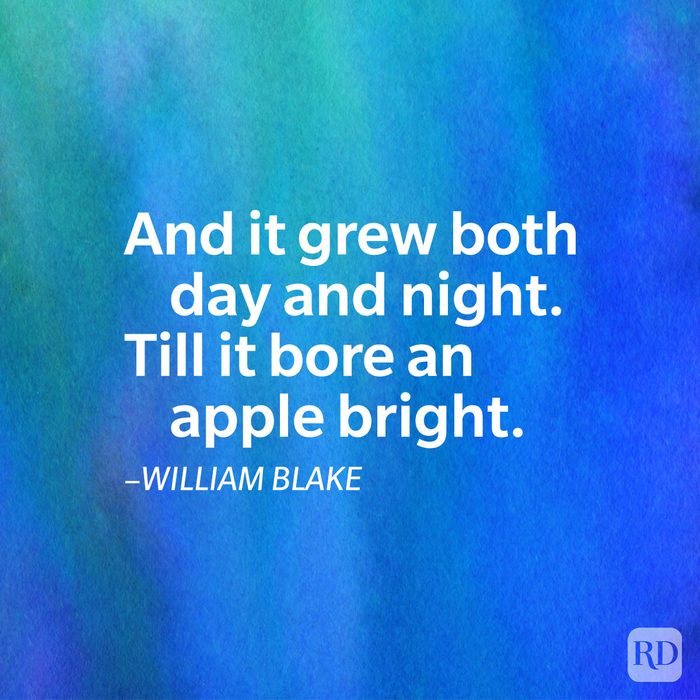
17. “A Poison Tree” by William Blake
I was angry with my friend;
I told my wrath, my wrath did end.
I was angry with my foe:
I told it not, my wrath did grow.
And I waterd it in fears,
Night & morning with my tears:
And I sunned it with smiles,
And with soft deceitful wiles.
And it grew both day and night.
Till it bore an apple bright.
And my foe beheld it shine,
And he knew that it was mine.
And into my garden stole,
When the night had veild the pole;
In the morning glad I see;
My foe outstretched beneath the tree.
Our list of the most famous poems ever written would not be complete without the work of William Blake, one of the most iconic poets of the English language. “A Poison Tree” explores the destruction of unchecked anger. When we don’t deal with our negative emotions but instead nurture them, they can grow out of control. The solution, the poem implies, is to resolve issues before they do harm.
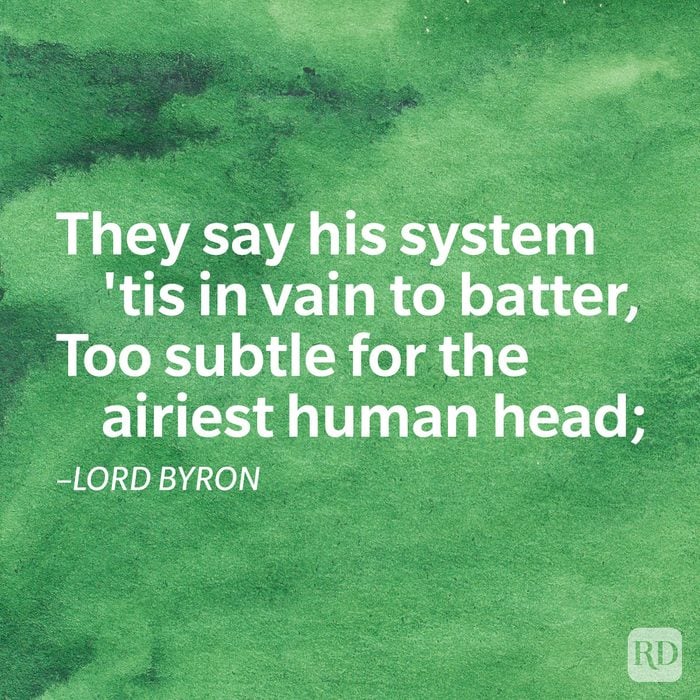
18. “Don Juan” by Lord Byron
When Bishop Berkeley said “there was no matter,”
And proved it—’twas no matter what he said:
They say his system ’tis in vain to batter,
Too subtle for the airiest human head;
And yet who can believe it! I would shatter
Gladly all matters down to stone or lead,
Or adamant, to find the World a spirit,
And wear my head, denying that I wear it.
Anybody slightly familiar with English poetry will instantly recognize the name Lord Byron—and for good reason. As one of the leaders of the Romantic Movement, Byron (George Gordon) wrote many poems that have since been engraved in history. One of his most well-known works, “Don Juan” is a poem of epic proportions filled with adventure and sensuality. At 16,000 lines (divided into 17 cantos), it’s also one of the longest poems on this list, though it’s worth reading the full story. If you’re a fan of sweeping fiction or romance novels, this epic poem is for you.
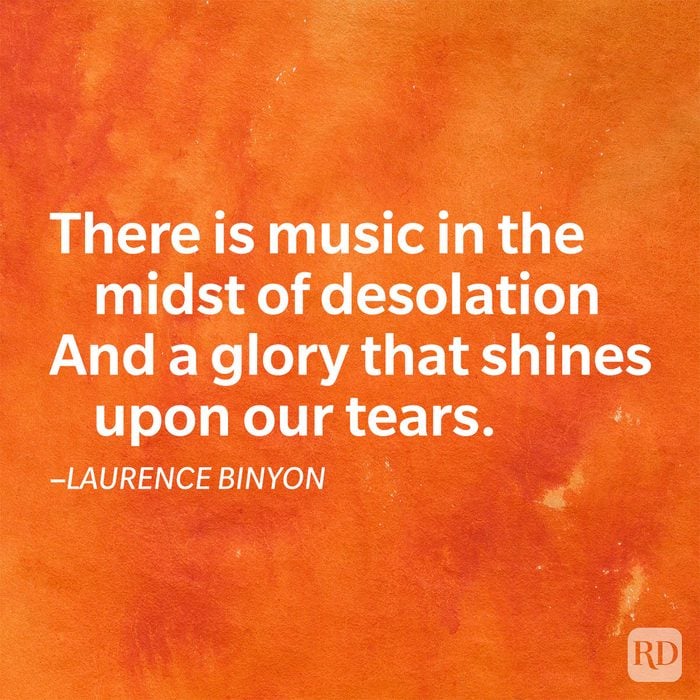
19. “For the Fallen” by Laurence Binyon
With proud thanksgiving, a mother for her children,
England mourns for her dead across the sea.
Flesh of her flesh they were, spirit of her spirit,
Fallen in the cause of the free.
Solemn the drums thrill; Death august and royal
Sings sorrow up into immortal spheres,
There is music in the midst of desolation
And a glory that shines upon our tears.
They went with songs to the battle, they were young,
Straight of limb, true of eye, steady and aglow.
They were staunch to the end against odds uncounted;
They fell with their faces to the foe.
They shall grow not old, as we that are left grow old:
Age shall not weary them, nor the years condemn.
At the going down of the sun and in the morning
We will remember them.
Originally published in The Times in 1914, “For the Fallen” is Laurence Binyon’s tribute to the English soldiers fighting for their country during World War I. The lines “They shall grow not old” and “We will remember them” continue to be some of the most famous lines of poetry ever written. The above excerpt is a testament to the poem’s power, but it’s worth reading the poem in its entirety.
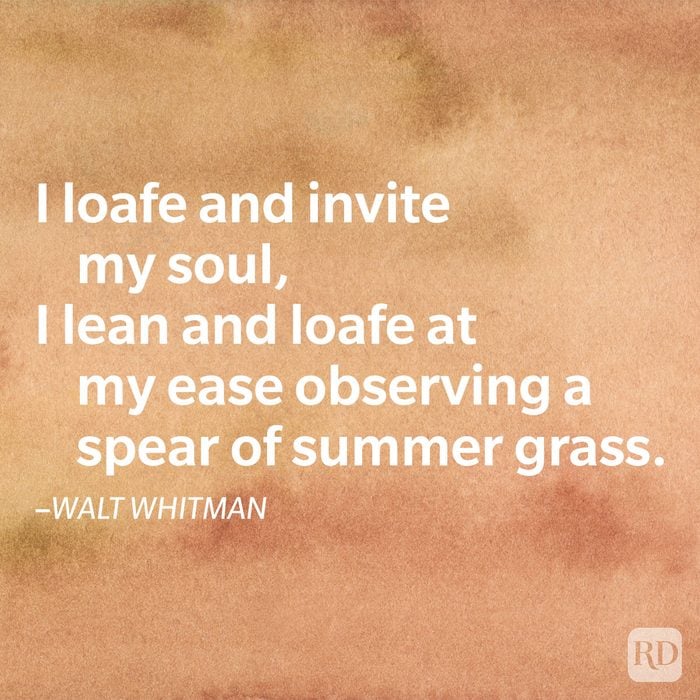
20. “Song of Myself” by Walt Whitman
I celebrate myself, and sing myself,
And what I assume you shall assume,
For every atom belonging to me as good belongs to you.
I loafe and invite my soul,
I lean and loafe at my ease observing a spear of summer grass.
My tongue, every atom of my blood, form’d from this soil, this air,
Born here of parents born here from parents the same, and their parents the same,
I, now thirty-seven years old in perfect health begin,
Hoping to cease not till death.
When I think of the most famous lines of poetry ever written, “I contain multitudes” is one of the first to come to mind. Walt Whitman’s celebration of his singularity and uniqueness, which has inspired readers and artists alike—even Bob Dylan—imposes itself as an iconic statement in the history of poetry. The opening stanzas above are just a taste of Whitman’s genius. Check out his book Leaves of Grass to read the full poem, which is broken into 52 sections. This is self-love at its most inspired.
